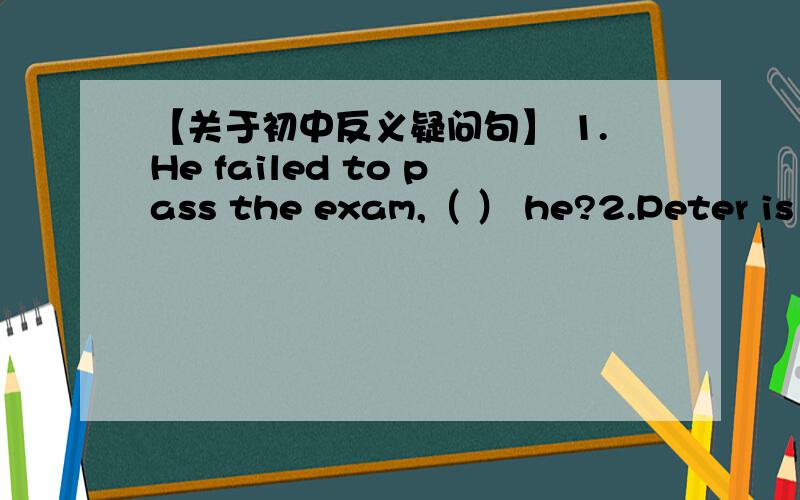【关于初中反义疑问句】 1.He failed to pass the exam,( ) he?2.Peter is a man of few words,( ) he?3.They had to get off at the next stop,( ) they?都是反义疑问句.我有些不确定.应该84很难得
来源:学生作业帮助网 编辑:作业帮 时间:2024/11/15 07:49:14

【关于初中反义疑问句】 1.He failed to pass the exam,( ) he?2.Peter is a man of few words,( ) he?3.They had to get off at the next stop,( ) they?都是反义疑问句.我有些不确定.应该84很难得
【关于初中反义疑问句】
1.He failed to pass the exam,( ) he?
2.Peter is a man of few words,( ) he?
3.They had to get off at the next stop,( ) they?
都是反义疑问句.
我有些不确定.应该84很难得
【关于初中反义疑问句】 1.He failed to pass the exam,( ) he?2.Peter is a man of few words,( ) he?3.They had to get off at the next stop,( ) they?都是反义疑问句.我有些不确定.应该84很难得
第一题failed为过去时,应填didn't,第二题is为一般现在时,应填isn't,第三题had为过去时,应填didn't.一般来说改反义疑问句可直接看前面的谓语,时态要一致,单复数一致,当然还有特殊情况,你可以加我为好友,在这方面有什么问题就问问我,我乐意帮你!
did
isn't
hadn't
didn't isn't hadn't
didn't
isn't
hadn't
否定意义的词
否定意义的词 (1)当陈述部分有never,seldom, hardly,few,little,barely, scarcely, nothing 等否定意义的词时,后面的反意疑问句则为肯定形式: There are few apples in the basket, are there? He...
全部展开
didn't
isn't
hadn't
否定意义的词
否定意义的词 (1)当陈述部分有never,seldom, hardly,few,little,barely, scarcely, nothing 等否定意义的词时,后面的反意疑问句则为肯定形式: There are few apples in the basket, are there? He can hardly swim, can he? They seldom come late, do they? (2)当陈述部分含有否定意思的词是unhappy,dislike,unfriendly等含有否定词缀的派生词,也就是有un-前缀、-less后缀等含有词缀而意思否定的词,当做肯定句处理,疑问部分要用否定形式。如: He looks unhappy,doesn't he?他看上去不高兴,不是吗? The girl dislikes history,doesn't she?这女孩不喜欢历史,不是吗?
表示主语主观意愿的词
含有think, believe, suppose, imagine, expect等动词后接宾语从句构成的主从复合句在构成反意疑问句时,视情况不同有两种不同的构成方式。 (1.)当主句的主语为第一人称时,其后的简短问句应与从句相一致。例如: I expect our English teacher will be back this weekend, won't she/he? We suppose you have finished the project, haven't you? 值得注意的是,当这些动词后接的宾语从句的否定转移到主句时,其仍属否定句,故其后的简短问句应用肯定式,而非否定式。例如: I don't believe that he can translate this book, can he? Wedon't imagine the twins have arrived, have they? 此类句子的回答同"前否后肯"型反意疑问句一样,如上述后一个句子,若双胞胎已经到了,则回答为"Yes, they have.";若尚未到达,使用"No, they haven't."。 (2).当主句的主语为第二、三人称时,其后的简短问句则应与主句相一致(此时,否定只看主句,与从句无关...)。例如: Your sister supposes she needs no help, doesn't she? You thought they could have completed the project, didn't you? They don't believe she's an engineer, do they? She doesn't expect that we are coming so soon, does she? (3)但如果主句的时态是过去时等等,疑问句应和主句的人称时态保持一致。
had better或have
陈述部分有had better,或其中的have表示完成时态时,疑问句应用hadn’t等开头: You’d better get up early, hadn’t you? 其他情况句中有have时疑问句应用don't等开头 如have表示“有”的时候,有两种形式: -He has two sisters,doesn't he? -He doesn't have any sisters,does he?
祈使句
当陈述部分是祈使句时,疑问句要根据语气来表达 当开头是Let‘s时,一定要用shall we。其余都用will you(包括 Let us)不论肯定否定 Let’s go out for a walk, shall we? Let us go out for a walk, will you? Let me help you,may I? Turn on the radio, will you?
There be句型
There be 句型中,反义疑问部分必须为be 动词 + there There are some apples in the basket, aren't there? There isn't any milk left, is there?
must
.当陈述部分有情态动词must,问句有4种情况: (1)mustn't表示“禁止,不可,必须”时,附加问句通常要用must. You mustn't stop your car here,must you? 你不能把车停在这地方,知道吗? (2)must表示“有必要”时,附加问句通常要用needn't. They must finish the work today,needn't they? 他们今天要完成这项工作,是吗? (3)当must用来表示对现在的情况进行推测时,问句通常要根据must后面的动词采用相应的形式。 He must be good at English,isn't he? 他英语一定学得很好,是吗? (4)当must+have done表示对过去的情况进行推测(一般句中有明确的过去时间状语),问句要根据陈述部分谓语的情况用“didn't+主语”或“wasn't/weren't+主语”;如果强调动作的完成(一般没有明确的过去时间状语),问句要用“haven't/hasn't+主语”。 She must have read the novel last week,didn't she? 她上星期一定读了这本小说,是吗? You must have told her about it,haven't you? 你一定把这事告诉她了,是吗?
[编辑本段]回答
反意疑问句的回答用yes, no, 但是,回答意思相反,当陈述部分是否定形式时,回答要按事实。如: They don’t work hard, do they? 他们不太努力工作,是吗? Yes, they do. 不,他们工作努力。/No, they don’t. 对, 他们工作不努力
肯定反意疑问句的回答
当陈述部分为否定式,反意疑问句为肯定式时,其回答往往与汉语不一致,需特别引起注意: "It isn’t cheap, is it?" "Yes, it is." “它不便宜吧?”“不,很便宜。” "He doesn’t love her, does he?" "No, he doesn’t."“他不爱她,是吗?”“是的,他不爱她。” 此时,"Yes"即不,对前面"It isn't cheap."的否定。
否定反意疑问句的回答
当陈述部分为肯定式,反意疑问句为否定式时,其回答一般不会造成困难,一般只需照情况回答即可: "It’s new, isn’t it?" "Yes, it is." “是新的,对吗?”“对,是新的。” "He wants to go, doesn’t he?" "No, he doesn’t." “他想去,对吗?”“不,他不想去。” 此时,"No"即是,对前面"It's new."的肯定。
回答反意疑问句的原则
回答反意疑问句通常应根据实际情况来确定,如有人问你You are asleep, aren’t you? 你应回答No, I’m not. 因为既然你能回答,肯定你还没有asleep。但如果别人问你 You aren’t asleep, are you?(你还没有睡着,对吗),你也只能回答No, I’m not.(是的,还没有睡着),而不能回答为Yes, I’m not. 也不能回答成 Yes, I am. “It is a beautiful flower,isn't it?” “It isn't a beautiful flower,is it?” 上述两句句子的回答肯定均为“Yes,it is."否定为“No,it isn't." 由上述例子可知,反义疑问句回答与句子本身所包含的中文肯定与否的含义并无太大关联,只需注意事实,肯定即用yes,否定用no,无需考虑句子原本是前否后肯或是前肯后否。
[编辑本段]重点归纳
快速记忆表 陈述部分的谓语 疑问部分 I aren't I Wish may +主语 no,nothing,nobody,never, few, seldom, hardly, 肯定含义 rarely, little等否定 含义的词 ought to(肯定的) shouldn't/ oughtn't +主语 have to+v.(had to+v.) don't +主语(didn't +主语) used to didn't +主语或 usedn't +主语 had better + v. hadn't you would rather + v. wouldn't +主语 you'd like to + v. wouldn't +主语 must 根据实际情况而定 感叹句中 be +主语 Neither…nor, either…or 连接的根 据其实际逻辑意义而定 并列主语 指示代词或不定代词 everything,that, 主语用it nothing,this 并列复合句 谓语根据邻近从句的谓语而定 定语从句,宾语从句的 主从复合句 根据主句的谓语而定 think,believe,expect, suppose,imagine等引导 与宾语从句相对应的从句 everybody,anyone, somebody,nobody,no one 复数they, 单数he 情态动词dare或need need (dare ) +主语 dare, need 为实义动词 do +主语 省去主语的祈使句 will you? Let's 开头的祈使句 Shall we? Let us 开头的祈使句 Will you? there be 相应的谓语动词+there(省略主语代词) 否定前缀不能视为否定词 仍用否定形式 must表"推测" 根据其推测的情况来确定反意疑问句
收起
1.He failed to pass the exam,( didn't ) he?
2.Peter is a man of few words,( isn't ) he?
3.They had to get off at the next stop,( hadn't ) they?